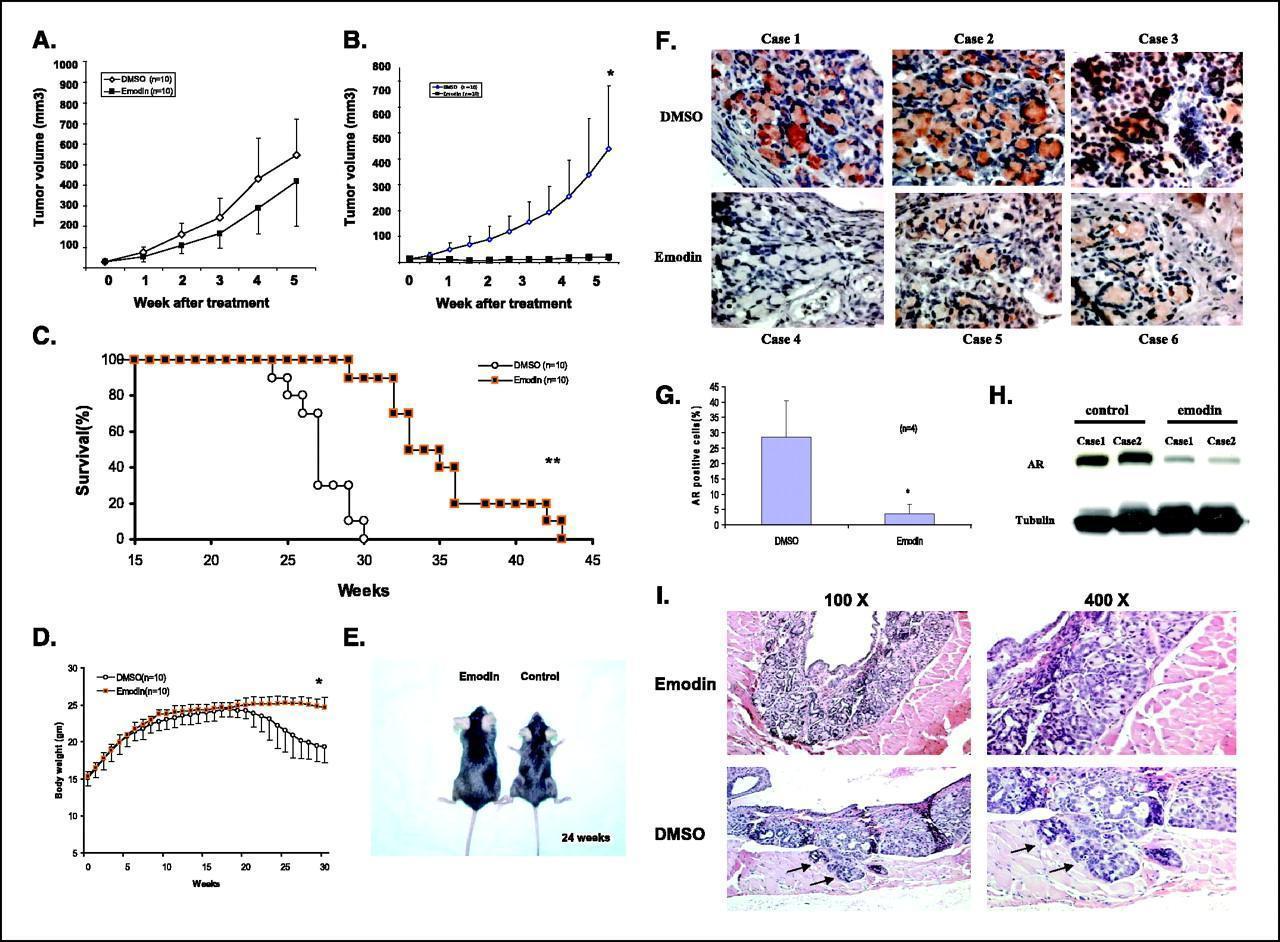In the research paper linked under references; conducted by the American Association for Cancer Research, it was determined that Emodin very significantly deregulates androgen receptors in mice. The doses used were not very high. Only 40 mg/kg of Emodin was injectioned every other day. Based on my calculations, the human equivalent would only be~100 mg everyday for a 150 lb male. The recommend dose for Lapodin has 80 mg of Emodin.
The study is unique in that the anti-androgen effects of Emodin were shown both vitro and vivo (with mice).
Emodin was shown in vitro to be very effective at blocking the androgen R1881 affects on the cell. Considering the low concentration needed, much lower doses than are present in Lapodin will likely have some inhibition effect on androgen receptors.
Looking at Graph G. and H. in particular, Emodin reduced the androgen receptor density to less than 20 percent of the control! This probably correlates to the mice using a comparable mice dose to a serving of Lapodin.

It is worth mentioning, that Emodin was very well tolerated, generally not toxic and is likely very effective against prostate cancer that is "AR dependent." The Emodin mice in the picture above is clearly healthier looking than the control.
All in all; It looks like you may have to unfortunately add anti-androgenic to the list of it's amazing medicinal properties of Emodin.
It may be non-toxic, anti-cancerous, anti-serotonin, anti-inflammation, but...it appears to have to anti-androgenic effects by inhibiting the effects of androgens on cells. Emodin may target cancer cells more aggressively (as shown in the vitro study); however, I think it's foolish to think that the dissociation of hsp90 and enhance MDM2 does not lead to some degradation of AR in healthy cells. Please correct me if I'm mistaken.
It's worth mentioning that beta-lapachone, the other quinone of Lapodin, is likely SAFE from these effects.
@haidut, what's your thoughts? I am a big fan of your research and your posts on the forum. I've bought from idealabs in the past. Have you stumbled upon this paper in your readings? Is there something I overlooked or is out of content?
References:
Emodin down-regulates androgen receptor and inhibits prostate cancer cell growth. - PubMed - NCBI
Emodin Down-Regulates Androgen Receptor and Inhibits Prostate Cancer Cell Growth | Cancer Research
Beta-lapachone, a specific competitive inhibitor of ligand binding to the glucocorticoid receptor. - PubMed - NCBI
The study is unique in that the anti-androgen effects of Emodin were shown both vitro and vivo (with mice).
Emodin efficiently inhibited LNCaP cell proliferation and DNA synthesis stimulated by R1881 in a dose-dependent manner; meanwhile, the inhibition was also significant at low concentration ( Fig. 1C and D).
Emodin was shown in vitro to be very effective at blocking the androgen R1881 affects on the cell. Considering the low concentration needed, much lower doses than are present in Lapodin will likely have some inhibition effect on androgen receptors.
Emodin can significantly disrupt the association between AR (Androgen Receptors) and hsp90 whether treated for a short period (2 hours; Fig. 4B) or a longer period (8 hours; data not shown). This result indicates that emodin induces dissociation of AR and hsp90 involving a novel mechanism different from other tyrosine kinase inhibitors. The emodin-induced dissociation between AR and hsp90 may render the incomplete AR heterocomplex more vulnerable to degradation through the proteasome-mediated pathway...these results indicate that emodin dissociates hsp90 from AR and enhances AR and MDM2 association, which may lead to further ubiquitination and degradation.
Considering the success of the recent finasteride prevention trial for prostate cancer and the dilemma it created due to its androgen deprivation nature, emodin, which directly down-regulates AR in a ligand-independent manner, may have an advantage for further development as a therapeutic and chemopreventive agent for prostate cancer.
Looking at Graph G. and H. in particular, Emodin reduced the androgen receptor density to less than 20 percent of the control! This probably correlates to the mice using a comparable mice dose to a serving of Lapodin.

Emodin-treated mice maintained their body weight gain and physical activity, suggesting that the effective dose of emodin, which suppresses tumor progression, is well tolerated and nontoxic.
It is worth mentioning, that Emodin was very well tolerated, generally not toxic and is likely very effective against prostate cancer that is "AR dependent." The Emodin mice in the picture above is clearly healthier looking than the control.
All in all; It looks like you may have to unfortunately add anti-androgenic to the list of it's amazing medicinal properties of Emodin.
It may be non-toxic, anti-cancerous, anti-serotonin, anti-inflammation, but...it appears to have to anti-androgenic effects by inhibiting the effects of androgens on cells. Emodin may target cancer cells more aggressively (as shown in the vitro study); however, I think it's foolish to think that the dissociation of hsp90 and enhance MDM2 does not lead to some degradation of AR in healthy cells. Please correct me if I'm mistaken.
It's worth mentioning that beta-lapachone, the other quinone of Lapodin, is likely SAFE from these effects.
"Interestingly, this compound (beta lapachone) does not affect the ligand-binding sites of estrogen, progesterone, androgen, or mineralocorticoid receptors or serum transcortin. Thus, beta-lapachone can be utilized as a specific probe for the ligand-binding site of the glucocorticoid receptor."
@haidut, what's your thoughts? I am a big fan of your research and your posts on the forum. I've bought from idealabs in the past. Have you stumbled upon this paper in your readings? Is there something I overlooked or is out of content?
References:
Emodin down-regulates androgen receptor and inhibits prostate cancer cell growth. - PubMed - NCBI
Emodin Down-Regulates Androgen Receptor and Inhibits Prostate Cancer Cell Growth | Cancer Research
Beta-lapachone, a specific competitive inhibitor of ligand binding to the glucocorticoid receptor. - PubMed - NCBI
Last edited:
